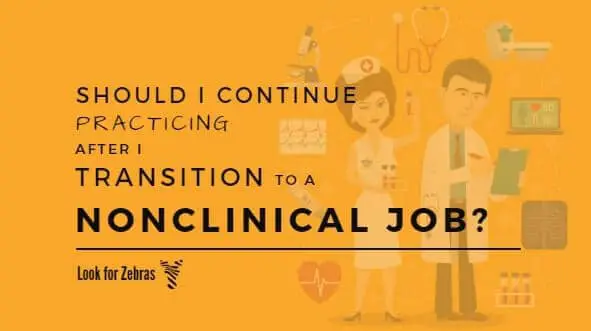Published by Lookforzebras
Q: I’m looking into jobs for doctors outside of medicine, primarily in the pharmaceutical industry or health insurance. I have two young kids and want a better schedule and more time to spend with them. I don’t hate my hospital job, but I am looking forward to a change. I don’t know if I’ll want to return to clinical medicine once they’re older.
Is it necessary to try to continue practicing clinically after transitioning to a nonclinical job?
A:Though I don’t have much detail about your personal situation, it sounds like finding a route to continue practicing clinically in some way would be preferable for you. Read on for my rationale.
Reasons to continue practicing clinically
Whether to continue working clinically while exploring jobs for doctors outside of medicine is a very individual question. There are a handful of solid reasons why it doesn’t make sense for some physicians to keep working clinically. There are also several reasons that many doctors should continue clinical work.
1. You may want to return to clinical medicine at some point
It can be tough to reenter clinical medicine if you’ve gone a long time without practicing. If there’s a chance you want to return to a clinical job down the road, it will be a much easier transition if you’ve recently been doing clinical work of some type.
Even if you think you’ll never want to go back to a clinical job, we all change our minds from time to time. Our situations change, our interests evolve, and our priorities switch directions. By continuing clinical work, you may be able to better accommodate these life changes.
The amount of clinical work doesn’t have to be a lot. Even a half-day shift each week helps to keep your skills sharp, prompts you to stay up to date in your field, and looks good to potential employers.
2. It legitimizes you, especially among other doctors
There’s a good chance you’ll be interacting with other physicians in your nonclinical role. Some of them are likely to be practicing clinicians. It will be easier to gain their respect and connect with them if you do clinical work. I’m not saying this is how it should be, but it’s the way it is.
If you continue to treat patients, other physicians may find it easier to communicate with you, feel that you understand them, and believe that you can empathize with their pain points.
3. It’s easier to change positions – even to other jobs for doctors outside of medicine
Many jobs for doctors outside of medicine require the applicant to have a certain amount of clinical experience. Some require that the clinical experience be recent. It may not matter if your most recent non-clinical job was in the same field as the new job you’re applying for. Employers tend to value recent, uninterrupted clinical experience.
So, you can make a future job search easier by being able to say, “While my primary role has been non-clinical, I’ve continued to see patients to keep my clinical skills current.”
4. It will help you maintain your board certification
Physicians planning to maintain board certification can almost always benefit from retaining some clinical work. Depending on your specialty board, clinical work can:
- Make it easier to prepare for the board exam
- Help you earn maintenance of certifications “points” or meet requirements
- Prevent scrutiny of your application by the board
Maintaining board certification can, in turn, help you obtain and renew medical licenses. It’s also a requirement for most clinical jobs as well as many jobs for doctors outside of medicine.
5. Clinical work can be a significant source of extra income
Clinical work often pays better than jobs for doctors outside of medicine. Sometimes much better, depending on the field and the type of nonclinical work you’re comparing it to. Because of this, retaining some clinical practice can be a significant source of extra income if you’ve transitioned to a non-clinical job.
The pay from even a single moonlighting shift each week can really add up.
Whether this is a consideration for you depends on your own financial situation and goals. Early career physicians with energy and enthusiasm, however, should think twice before giving up all their income from clinical work.
6. You can save on business and professional expenses
Healthcare companies place value on the care they provide to patients. They also need to limit their risk. So, they want to employ healthcare providers who are able to provide high quality, evidence-based medicine.
Clinical employers – even for part-time and moonlighting work – often cover the costs of medical licenses, certifications, and CME. While your non-clinical job might not require these, it’s good to keep current if there’s any chance you might need them in the future.
The company for whom you do clinical work might also pay for a cell phone, medical references such as UptoDate, or other equipment and materials that are helpful to have as a doctor.
7. You’ll have less explaining to do
Friends, family, colleagues, acquaintances, and new people you meet will inevitably ask you what you do. When they hear you’re a physician, they tend to have an expectation that you see and treat patients. These conversations are easier if you can tell them about your clinical work.
When you can mention that you see patients (even if it’s part-time or intermittently) people are less likely to get skeptical or make you feel unnecessarily guilty about leaving medicine.
Granted, there’s nothing wrong with not catering to peoples’ unjustified expectations. By all means, if you have the drive, fight the stereotypes.
The other perspective: leaving clinical medicine entirely
Despite all the reasons above to maintain some amount of clinical work, some doctors are best suited for exclusively non-clinical work. I’ll delve into the reasons for this in next week’s post – Why You Should Give Up Clinical Medicine.

